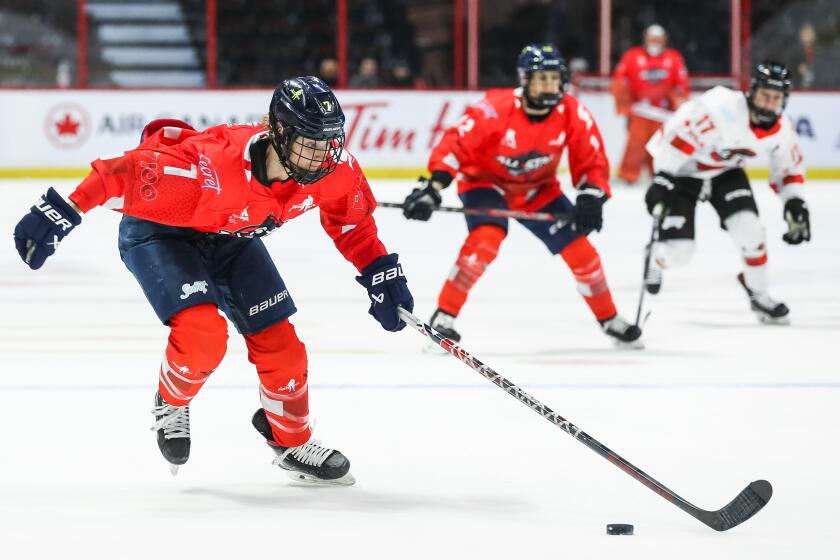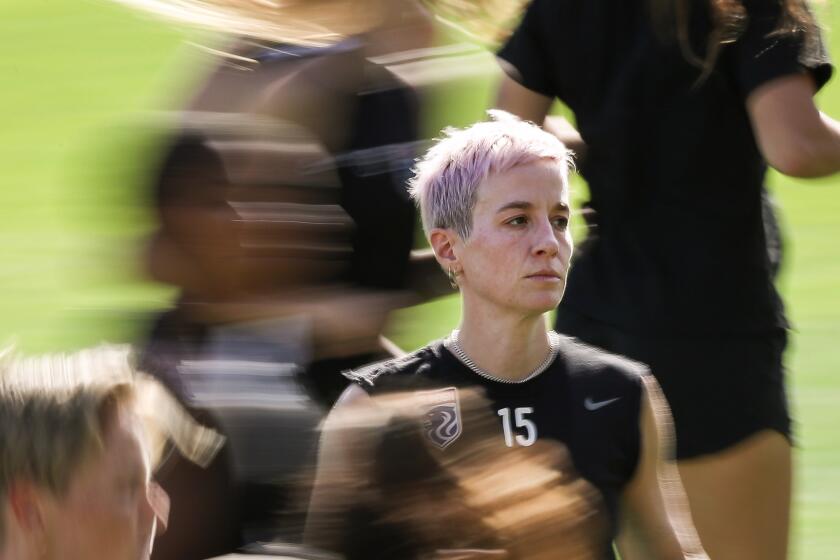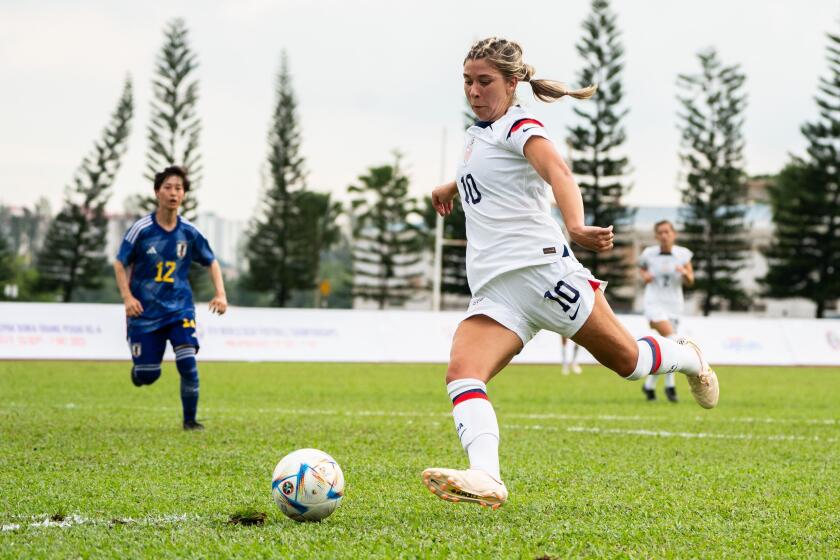Energized by a historic U.S-Canada rivalry, women’s hockey embraces its PWHL moment
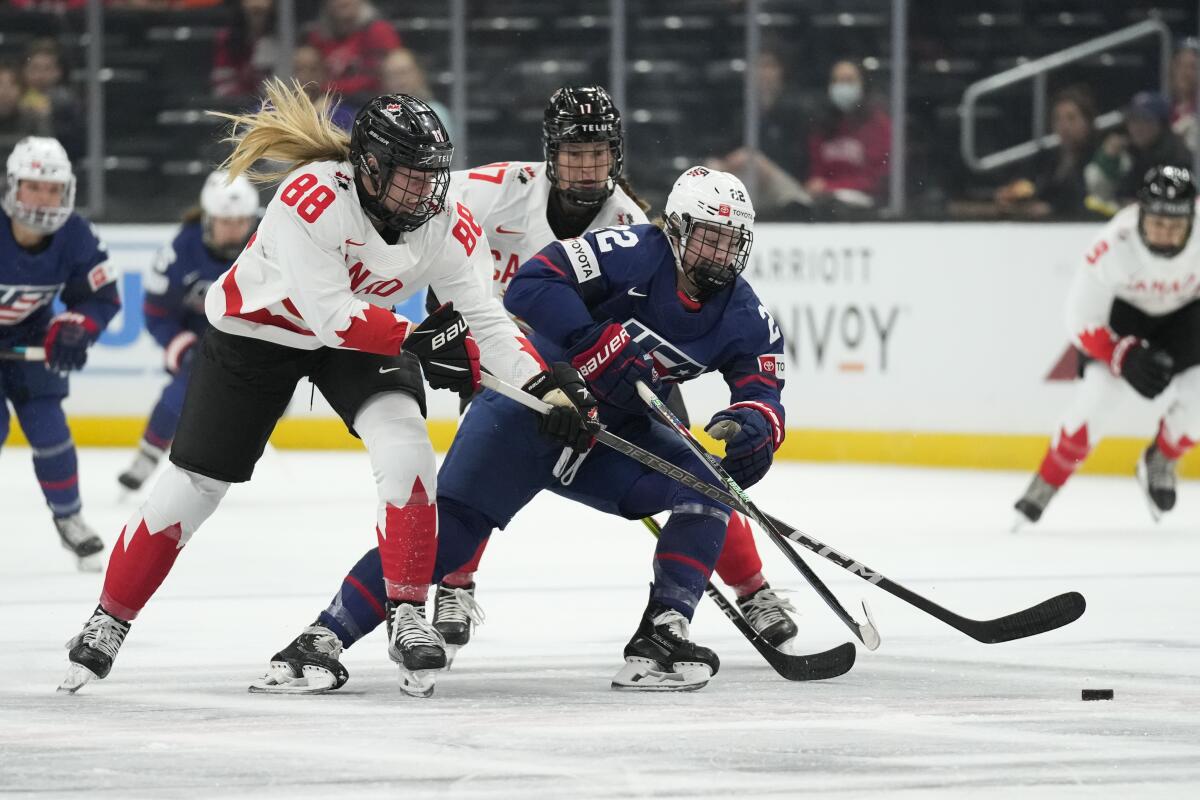
- Share via
Women’s hockey is ready for its big moment.
With Team USA lighting up Crypto.com Arena in a 5-2 victory over Canada on Saturday in their heated Rivalry Series and the Professional Women’s Hockey League set to open training camps Wednesday in advance of a January launch, this is the sport’s best opportunity yet to make an impact at every level.
“It’s amazing. It’s what we’ve dreamed about, you know?” two-time Olympic defenseman Cayla Barnes of Eastvale, Calif., said of the new league.
“You see 18- and 19-year-old boys being able to go play in the NHL, and we never had that, and now we have that opportunity to go play professionally and make a living and play year-round. You don’t have to have another job. It’s great seeing all the hard work that people have put in to make this happen, and hopefully it continues and continues to grow.”
Elliott: ‘We’re getting close to something really significant.’ Women’s hockey awaits big moment
The Professional Women’s Hockey Players Assn. is partnering with the Kings, Ducks and others to hold its 2022-23 season championship this weekend.
The financial backing of Dodgers controlling owner Mark Walter and the logistical expertise of women’s rights crusader and Dodgers part owner Billie Jean King alone would give the PWHL a fighting chance to avoid the fate of an alphabet soup’s worth of failed women’s hockey leagues. “Those are heavy hitters, right?” said Hilary Knight, a four-time Olympian.
Right. It also helps that there’s a newly favorable climate for women’s sports, energized by financial behemoths making significant investments.
The National Women’s Soccer League recently secured a $240 million media rights deal and is thriving. The WNBA just had its most-watched Finals in 20 years. Earlier this year, ESPN recorded its most-viewed women’s basketball Final Four weekend across its platforms.
Hockey has limitations compared to other sports: It’s widely perceived as a cold-weather game, and it’s expensive to play. Body checking, a staple of the men’s game, is forbidden in the women’s game. But the six-team PWHL — whose board includes Dodgers executive Stan Kasten — has the resources to market the league properly and survive the inevitable first-year problems. The league will start with teams in Boston, New York, Minnesota, Ottawa, Montreal and Toronto; each will play a 24-game schedule. Team names haven’t been announced.
“It’s one of those things: a rising tide lifts all ships,” said Knight, who signed with Boston. “Each sport is working with one another in different ways to try and raise that tide together.
“It’s awesome to see all the success in soccer and the WNBA. It’s contagious. And then it falls on hockey. And now we have a league. It’s a great time to be along for this journey.”
If not for Knight and other American women who vowed to boycott the 2017 world championships if USA Hockey didn’t increase their pay and devote more effort to player development and promotion, there wouldn’t be a Rivalry Series. And hockey would be poorer for it.
NWSL is booming, with attendance up 32%, Fortune 500 companies signing on as sponsors, team expansion and a historic new broadcast deal.
Establishing the series was important because it gives the sport’s superpowers a showcase between Olympics for their precise, entertaining style. The new support for player development has created an ever-deeper talent pool for the U.S. women, who in April won their 10th world championship. Fifteen players on the U.S. roster in this series and 21 from Canada are scheduled to play in the PWHL. Several others are still in college, including Barnes, who transferred from Boston College to Ohio State, and Laila Edwards, a promising Wisconsin sophomore.
The excitement always generated by this rivalry has intensified because there’s so much hope on the horizon.
“There’s just a lot of joy around this team from the get-go,” said U.S. coach John Wroblewski, who lives in Hermosa Beach. “Just a lot of happy people that I think are confident with where they’re at, and now they deservedly have even more direction and purpose in their lives with the pro league and for our young players’ aspirations.”
Knight, who had a goal and an assist in Team USA’s series-opening 3-1 victory Wednesday in Tempe, Ariz., assisted on her team’s first goal Saturday, by Alex Carpenter, daughter of Bobby Carpenter, a former Kings player. Knight also assisted on Gabbie Hughes’ second goal, late in the third period. Britta Curl and Hannah Bilka also scored for the U.S. The series will resume in December in Kitchener and Sarnia, Canada, followed by February games in Saskatoon and Regina, Canada, and St. Paul, Minn.
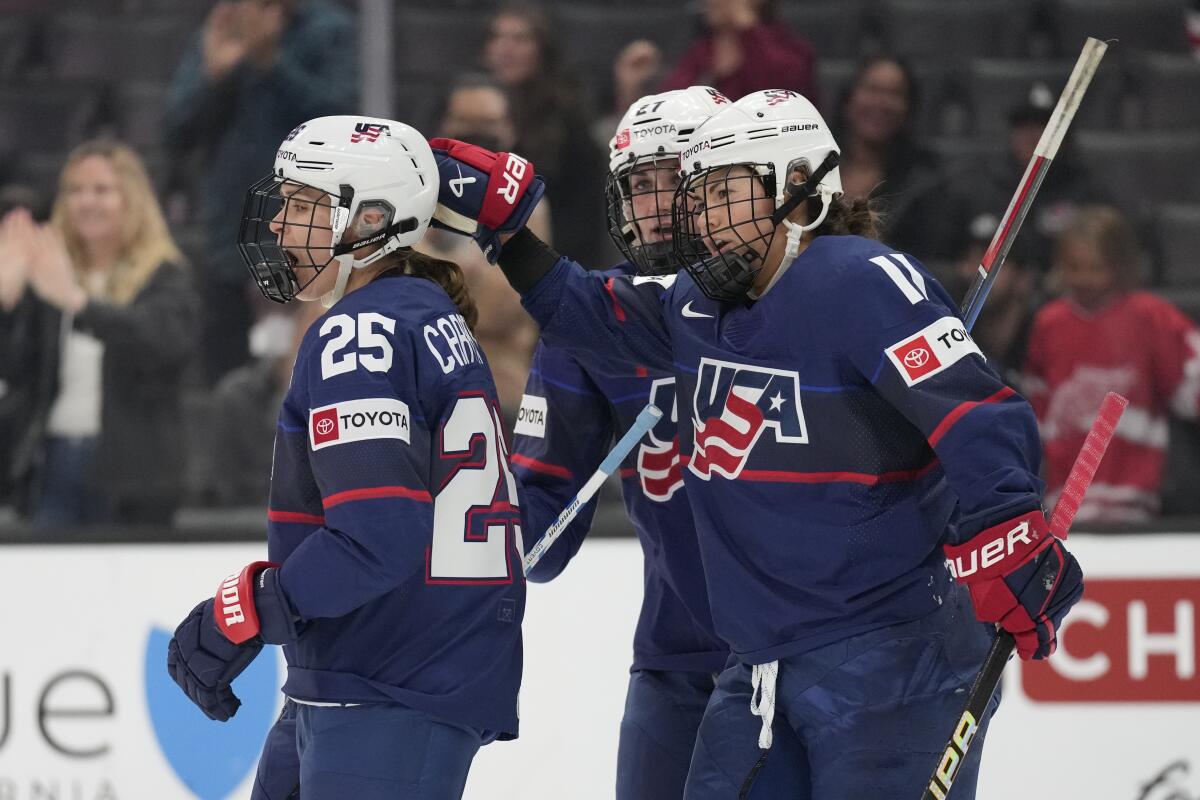
“It’s exciting from a competitor standpoint, from a fan standpoint,” Knight said of the series. “And to travel out to the West Coast, to California and Arizona and bring such a high-level event, is pretty cool.”
In April, Knight became the first player to record 100 points in women’s world championship play when she scored a hat trick in the gold-medal game. At 34, she’s still at the top of her game, but Wroblewski can envision her passing the torch of team leadership to Taylor Heise, formerly a standout at the University of Minnesota.
“She’s an extremely driven woman. She understands where she wants to get to, but is confident in that path. A great understudy for Hilary Knight,” Wroblewski said of Heise. “They’ve got some similarities with how they’re wired, different personalities, but as athletes, very direct and very self intrinsically motivated and ultimately extremely skilled as well. I can’t say enough about what her ceiling could be. We’re lucky to be along for the ride and have her as a big part of our program.”
Heise someday might be the answer to a trivia question: Who was the first player ever drafted by the PWHL? She laughed at that, but she’s serious about wanting to be known for being the right person at the right time to help lift her sport to new heights. There will be obstacles, but she had a strong, determined group teaching her that the reward is worth the battle.
Emily Spreeman has played a central role in the rise of the U.S. women’s deaf national soccer team, showing she can hold her own against World Cup stars.
“Women’s hockey has been on the rise for a really long time, moreso recently,” Heise said, “and I’m really, really excited to be in the great portion of it right now with a lot of the girls that have been the backbone for it. And they get to live out the dream that they have done so much work for.”
The work hasn’t ended, but the birth of the PWHL and the vitality of the U.S.-Canada rivalry have made this a seminal moment. Women’s hockey is ready for its closeup and its chance at stardom.
More to Read
Go beyond the scoreboard
Get the latest on L.A.'s teams in the daily Sports Report newsletter.
You may occasionally receive promotional content from the Los Angeles Times.

